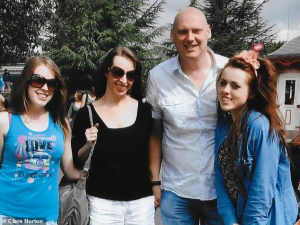By Stephen Matthews and Sam Blanchard for MailOnline, 23rd May 2019
Blamed for wasting doctors’ time, branded attention-seekers and told their ailment doesn’t even exist: Three ME patients reveal the accusations they have endured during their battle with the crippling condition
- It’s a controversial condition that has been swept under the carpet for decades
- But myalgic encephalomyelitis (ME) is physical – and is not made up by patients
- Millions of lives across the world are being ruined by the unrelenting condition
- Sufferers are often left house-bound, confined to their beds unable to move far
- MailOnline has spoken to three long-standing sufferers about their daily ordeals
It’s a controversial condition that has been swept under the carpet for decades amid claims that it is merely psychological.
Instead, the now-proven truth is myalgic encephalomyelitis (ME) is physical – and not just made up by mentally-ill patients.
Millions of lives around the world are being destroyed by the unrelenting condition, also known as chronic fatigue syndrome (CFS).
Sufferers are often left house-bound, confined to their beds, reliant on feeding tubes and even needing help to get them in the shower.
But, despite evidence proving it is real coming to the forefront, ME remains incurable and dozens of people wrongly think it is just ‘laziness’.
In the hope of ending ignorance surrounding the crippling ailment, MailOnline has heard from three long-standing sufferers.
Heartbreakingly, they revealed how doctors have blamed them for wasting their time, branded them attention-seekers and told their condition doesn’t exist.
| ME Association medical adviser Dr Charles Shepherd said: “ME is a condition that is all too easy for us to ignore because those afflicted by the condition are unseen by society.”
“So, we really welcome how MailOnline has given a platform for these three women to tell their heart-wrenching stories of life with this devastating, misunderstood disease.” “Sadly, there are another 250,000 people who also suffer from ME in the UK – and their own personal tales of tragedy remain largely hidden behind closed curtains.” “It is incredible to comprehend that some doctors still refuse to accept ME as a real medical condition, despite the countless stories of intense physical debility.” |
“I have been treated like a hypochondriac for a decade – now my condition is worse than ever,” Jennifer Chittick
Before being struck down by ME, Jennifer Chittick was out-going, hard-working and excited about her future as a primary school teacher.

Before being struck down by ME, Jennifer Chittick was out-going, hard-working and excited about her future as a primary school teacher (pictured at her graduation)
Now, a decade after falling ill, the 31-year-old is weaker than ever, completely bed-bound and reliant on her retired parents to care for her.
During her agonising battle to get diagnosed, doctors repeatedly dismissed her debilitating symptoms as being merely a product of her imagination.
And she claims this delay, fuelled by ignorance among the medical community, is the reason she is as poorly as she is today.
Ms Chittick, from Glasgow, said: “’Throughout my time with ME, the treatment I’ve received from doctors has been deplorable.”
“I am treated like a hypochondriac and an inconvenience, a blinkered patient who refuses to get the help her doctors believe she needs.”
GP appointments were a weekly occurrence when she first became ill in 2009, months after graduating from university and landing her first teaching job.
She said: “I was extremely nauseous, exhausted, dizzy and found it hard to concentrate. I began having to take more and more time off.”
“’Eventually I became so weak that I couldn’t dress myself or get off the couch and had to stop work altogether.”
| WHAT IS CHRONIC FATIGUE SYNDROME?
Some 250,000 people in Britain suffer from the condition, which comes with flu-like symptoms, extreme tiredness and mental lethargy that can last for years. Other symptoms of chronic fatigue syndrome (CFS), or myalgic encephalopathy (ME), include disturbed sleep, poor memory and reduced concentration. The cause of the illness is unclear, provoking the heated debate that has lasted for decades among the medical community. Some experts think the disease is triggered by a virus, in a similar way to glandular fever. It has also been linked to infections, operations and accidents. But skeptics think it is merely a psychological condition because of a lack of a physical cause, leading to a stigma that has led to sufferers being dismissed as having nothing more than ‘yuppie flu’ because it appeared to only strike young professionals when it rose to prominence in the 1980s. Some patients return to full health and others deteriorate progressively, however, most fluctuate between good and bad periods. There is no cure for CFS, with the majority of treatments to reduce symptoms being ineffective. They include cognitive behavioural therapy (CBT), graded exercise therapy and medications such as antidepressants. The World Health Organization and the Department of Health and Social Care recognise CFS as a medical condition. Worldwide it is believed that 17 million people suffer with CFS, according to the ME Association. |
In March 2010, she collapsed at home and was whisked away to an unnamed hospital – the three days she spent there were ‘amongst the worst of my life’.
Ms Chittick claims to have heard cruel nurses mutter the phrase ‘attention-seeker’ under their breath when they walked past her laying helplessly in bed.
And before she discharged with no answers to her ailment, medics allegedly refused to help her sit up in bed, give her water or even let her shower.

Now, a decade after falling ill, the 31-year-old is weaker than ever, completely bed-bound and reliant on her retired parents to care for her (pictured at home in bed)
“Despite my condition deteriorating drastically, I was repeatedly told that I’d be better after a good sleep and be back at work within a fortnight,” Ms Chittick said.
“As time dragged on and I became worse, my doctors became frustrated and angry with me. They were insistent that there was nothing seriously wrong with me.”
“They started suggesting I was suffering from anxiety and depression and complained about the ‘considerable amount of time’ I was taking up.”
It was only in late 2011, when she paid to see a private neurologist based in London who specialises in the condition that she was diagnosed with ME.
She said: “Receiving the diagnosis was confirmation that everything my family and I were going through wasn’t the result of my imagination or hypochondria.”
Over the years, Ms Chittick claims GPs have refused to visit her at home on the grounds that ‘ME doesn’t affect your ability to walk into the surgery’.
She also alleges they have shouted at her, asked her to accept her illness is anxiety, and refuse to carry out tests that may have proven she had ME.
In hope of combating her symptoms, doctors gave her cognitive behavioural therapy (CBT), provided by mental health specialists.
But the hour-long sessions failed to work. Nurses said it was because of a lack of motivation, a claim that was ‘soul-destroying’ for Ms Chittick to hear.
Gradual exercise therapy also proved unsuccessful. The physiotherapist treating her reportedly said this was because she was not trying hard enough.
Ms Chittick said the lack of belief that her condition was real made her feel ‘even more frustrated, alone and hopeless’.
| “I strongly believe that if I’d received different treatment from doctors, I would not be as ill as I am today,” Jennifer Chittick |
“The stress that doctors have caused has been a disaster for my health and contributed massively to the living nightmare of the last ten years.”
She added: “It should not have taken over a year to receive a diagnosis… I should not have had to struggle and fight to get the care and support I need.”
Ms Chittick hopes the ‘damaging attitudes’ she has encountered from doctors will one day be a ‘thing of the past’ and sufferers will be treated with the respect they deserve.
However, the founder of the SCREW ME support page which has several hundred followers on Facebook, isn’t alone in her battle with ignorant medics.
| “I’ve been too weak to venture far my bed for six years – but doctors have said the condition causing my fatigue doesn’t exist,” Jo Moss |
For years doctors told Jo Moss she was suffering from anxiety and depression or that she would be less tired if she didn’t sleep so much.
Now, 13 years after she was diagnosed with ME, the 44-year-old has been too weak to get out of bed for six years and doctors still don’t know how to help her.

For years doctors told Jo Moss she was suffering from anxiety and depression or that she would be less tired if she didn’t sleep so much
Instead, she claims they’ve done the opposite – telling her they don’t believe in the poorly-understood condition or that she doesn’t have ME at all.
“There isn’t any aspect of my life that hasn’t been affected,” said Mrs Moss, from Norwich.
“I have a severe form of ME which means I am confined to my bed due to fatigue, weakness and chronic pain, and I rely on carers and my husband for most things.”
Antidepressants prescribed by a doctor who misdiagnosed her only made the symptoms worse, she said, and only one doctor has been both sympathetic and knowledgeable.
“Many doctors have dismissed my symptoms and my ME diagnosis,” Mrs Moss said. “And the doctors that actually want to help lack the knowledge to.”
Despite being referred to a specialist clinic when she was first diagnosed, Mrs Moss said she never actually saw a doctor and was just taught to pace herself.
In other attempts to seek help she was told she actually had PTSD instead, that too much sleep was causing her crippling fatigue, and one warned her to get up, saying ‘you are going to die in that bed’.

Now, 13 years after she was diagnosed with ME, the 44-year-old has been too weak to get out of bed for six years and doctors still don’t know how to help her
“Another doctor was extremely open about his disbelief of ME,” Mrs Moss said, revealing they told her: “I don’t believe in ME – it doesn’t exist.”
And one reportedly told her to join a pilates class at a time when Mrs Moss, married to David, 44, said she was barely strong enough to sit up on her own.
She fears a lack of understanding is driving doctors to view it as a mental problem rather than a real, measurable condition.
Mrs Moss added: “Although there is a huge amount of evidence available from a multitude of studies proving that ME is a neurological condition, there are still so many medical professionals who believe it’s a mental disorder.”
“Until a definitive test is established that confirms a diagnosis of ME, I fear this attitude will continue.” Jo Moss
Mrs Moss was training to become an independent financial advisor before she became ill.
| WHAT IS THE PACE TRIAL?
The 2011 PACE trial, published in The Lancet, was the largest trial to date of people with the mysterious and debilitating condition – based on 641 people. Queen Mary University of London experts, among others, found up to 60 per cent of patients improved if therapists encouraged them gradually to do more. By contrast, patients whose therapists encouraged them to accept the limits of their illness and adapt their lifestyles to live with it showed significantly less improvement when they were followed up after 24 and 52 weeks. The original results of the £5million trial showed that CBT and exercising benefited up to 60 per cent of patients. The findings of the study have been used to help form the basis of treatment in Britain and the US and helped spark a debate that the condition is merely psychological. But a re-analysis of the findings, fought for by critics, showed the true results to be much closer to the 20 per cent mark, StatNews reports. Campaigners have since asked for the trial to be retracted, citing its various flaws, mainly relaxed medical standards after the trial had begun. |
“My daughter was ruled to have died from ME – denying the condition exists is akin to refusing to believe climate change,” Clare Norton
It’s been two years since a coroner ruled ME was to blame for the death of young drama student Merryn Crofts.
But her devastated mother, Clare Norton, says the unjustified stigma and lack of knowledge surrounding the cruel condition remains a major issue.
The 50-year-old said: “There is now more than enough biomedical evidence out there proving ME is not hysteria or deconditioning. To argue otherwise is similar to climate change deniers.”
“It is time for egos to be put aside, for the science to be listened to, for patients to be listened to and the Hippocratic Oath to be remembered – do no harm.”

It’s been two years since a coroner ruled ME was to blame for the death of young drama student Merryn Crofts (pictured)
“My daughter did not die of “hysteria” or “deconditioning”. She died due to multi-systemic neuroimmune ME.”
Merryn weighed less than six stone and spent the last three years of her life totally bed-bound with a severe form of the condition.
The would-be theatre star was unable to take more than two teaspoons of food before suffering immense gut pain and vomiting.
She became only the second person in the UK to have ME listed on their death certificate. Merryn passed away days after her 21st birthday.
Mrs Norton said: “As I look back it is now nearly two years since our darling Merryn died and one year since her inquest which ruled her death was due to severe ME.”
“We hoped this ruling would influence other coroners, doctors and medical professionals to recognise how serious ME is – and that it can be fatal.”
| “It is shocking that Merryn is only the second person in the UK with ME as the official cause of death… there is no doubt others have died as a result this cruel disease.” Clare Norton |
“We need medical professionals to realise ME kills. For this to happen we need more biomedical research, which in turn requires more funding.”
“To get increased funding we need the people in power to recognise how serious ME is, and so the vicious circle continues.”

But her devastated mother, Clare Norton, says the unjustified stigma and lack of knowledge surrounding the cruel condition remains a major issue (pictured before her death, Merryn, mother Clare, stepfather Dave Norton and sister Amy Williams)
She added: “I was recently asked if Merryn was diagnosed now – eight years on – do I think things would be different, would treatment be better, and the stigma improved? Sadly, my answer was ‘no’.”
“Only this week I know of two families suffering from the lack of knowledge and stigma attached to ME.”
“One whose mother is being accused of fabricating the illness and the daughter threatened with being sectioned.”
“The other family are being threatened with fines for non-attendance when their daughter is too ill to attend school every day.”
Mrs Norton, from Rochdale, who used to work as an addiction’s counsellor, said she feels their pain and remembers what it is like to be misunderstood by the very services that should be helping.
Discussing the controversial PACE trial, she asked how prescribing exercising ever seemed like a good idea. She said: “It is like prescribing sugar to diabetics.”
| “I see a compelling similarity between the study linking autism and the MMR vaccine and the PACE trial.” Clare Norton |
“Both have been found to be flawed on reanalysis, both were published and supported by The Lancet, both have had a devastating effect on health.”
Pathologist Dr Daniel DuPlessis said at the time that a post-mortem of Merryn showed low-grade inflammation of nerve roots.
It was suggested that this inflammation could have made her bowel hypersensitive to processing nutrients.
Dr DuPlessis pointed out that Merryn, who would have been 23 last week, had inflammation of the ganglia – gatekeepers to sensations in the brain.
A post-mortem into the only other UK death attributed to ME, Sophia Mirza, 32, in 2006, also found ganglionitis.
ME expert at Salford Royal Hospital, Dr Annice Mukherjee, said she was convinced the illness was responsible for triggering Merryn’s intestinal failure.
The ME Association
Real People. Real Disease. Real M.E.
We are a national charity working hard to make the UK a better place for people whose lives have been devastated by an often-misunderstood neurological disease.
 If you would like to support our efforts – particularly during ME Awareness Week – and help ensure we can continue to inform, support, advocate and invest in biomedical research, then please donate today.
If you would like to support our efforts – particularly during ME Awareness Week – and help ensure we can continue to inform, support, advocate and invest in biomedical research, then please donate today.
Just click the image opposite and visit our JustGiving page for one-off donations, to establish a regular payment or to create your own fundraising event.
Or why not join the ME Association as a member and be part of our growing community? For a monthly (or annual) subscription you will also receive our exclusive ME Essential magazine.
ME Association Registered Charity Number 801279
from ME Association
https://www.meassociation.org.uk/2019/05/three-me-patients-reveal-the-accusations-they-have-endured-during-their-battle-with-the-crippling-condition-24-may-2019/
from https://www.meassociation.org.uk
#cfsme
No comments:
Post a Comment